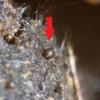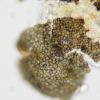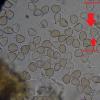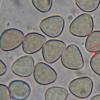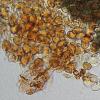
03-02-2026 20:44
Zetti MarioWhen I first saw this white mould on an Agaricus s

18-08-2025 15:07
 Lothar Krieglsteiner
Lothar Krieglsteiner
.. 20.7.25, in subarctic habital. The liverwort i

02-02-2026 21:46
Margot en Geert VullingsOn a barkless poplar branch, we found hairy discs

02-02-2026 14:55
 Andgelo Mombert
Andgelo Mombert
Bonjour,Sur thalle de Lobaria pulmonaria.Conidiome

02-02-2026 14:33
 Andgelo Mombert
Andgelo Mombert
Bonjour,Sur le thalle de Peltigera praetextata, ne

31-01-2026 10:22
 Michel Hairaud
Michel Hairaud
Bonjour, Cette hypocreale parasite en nombre les

02-02-2026 09:29
 Bernard CLESSE
Bernard CLESSE
Bonjour à toutes et tous,Pour cette récolte de 2

01-02-2026 19:29
 Nicolas Suberbielle
Nicolas Suberbielle
Bonjour, Marie-Rose D'Angelo (Société Mycologiq

31-01-2026 09:17
 Marc Detollenaere
Marc Detollenaere
Dear Forum,On decorticated wood of Castanea,I foun
Kernia??
Sven Heinz,
19-10-2019 19:16
Hello,
i found this fungi on dung of Cavia porcellus. Does anyone have an idea what that is? Maybe Kernia?
Fruitbody: 200 - 250 µ diameter, no hairs
Ascus: not see
Spores: triangolar, 7 x 6 µ
Greetings Sven
Michel Delpont,
19-10-2019 21:18

Re : Kernia??
Hello Sven
I think it is the genus Kernia, the spore measurement and the shape could be K.hippocrepida or maybe K.peruviana, but the latter has smaller spores. You would have to see if the perithecia are hairy or not, but also if the spores have one or two pores.
Michel.
Norbert Heine,
20-10-2019 00:27

Re : Kernia??
Like Michel says, Kernia hippocrepida seems to be a good idea because of the reniform ascospores. Nice found!
Maybe that's a "non-ostiolate relative of Microascus trigonosporus" (Arx et al. 1988).
Norbert
Sven Heinz,
20-10-2019 17:51
Re : Kernia??
Thank you for help!
Greetings Sven
David Malloch,
20-10-2019 18:07

Re : Kernia??
The little crack in the cleistothecium appears to be showing orange ascospores typical of Kernia and other Microascaceae. If you have young material the developing ascospores may be strongly dextrinoid in Melzer's. I rather doubt it is K. hippocrepida, which has more horseshoe-shaped ascospores.
You might also wish to consider some other fungi previously included in Thielavia, such as Eremodothis angulata and Chaetomium hamadae (described by Cain as Thielavia variospora). A culture with anamorphs would help too.
You might also wish to consider some other fungi previously included in Thielavia, such as Eremodothis angulata and Chaetomium hamadae (described by Cain as Thielavia variospora). A culture with anamorphs would help too.

